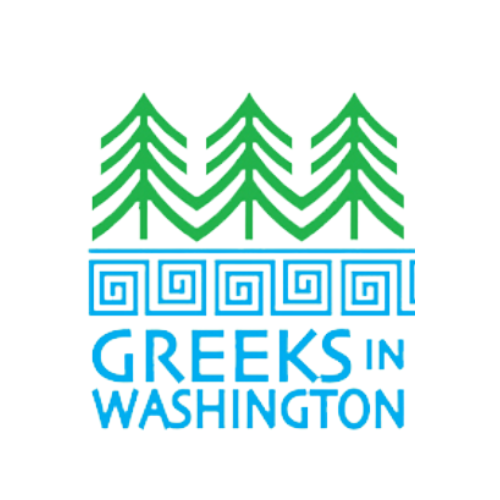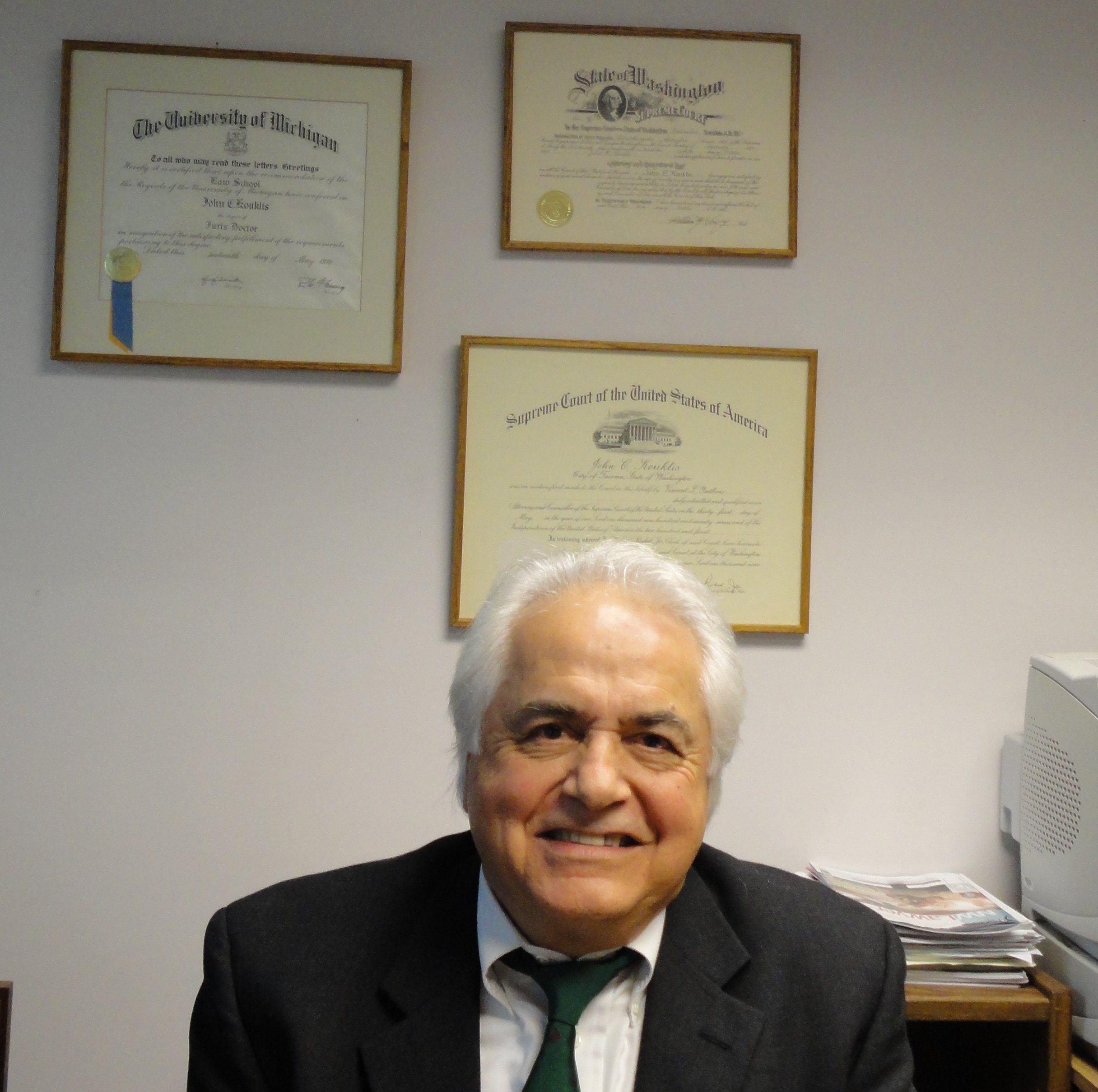Lawyer as Secular Priest
John Kouklis in his law office, 2013 by John Nicon
While Fr. Kouklis conducted baptism or funeral services in the church, his son was in court for an adoption or a will probate. With three generations of priests before him, it is no surprise that John Kouklis sees his work as providing meaningful, if not spiritual, services to his clients. As a priest’s son and an attorney, John draws some interesting comparisons of his and his father’s service in Tacoma, Washington.
Born In The Town Of Kefalas
Costas Kouklakis with his father, Fr. Ioannis Kouklakis, circa 1922
John Kouklis (Ioannis Kouklakis) was born in the town of Kefalas on the western side of the island of Crete, Greece, in February 1940. His maternal grandfather, John Angavanakis, came to the United States in 1910 and worked in the Utah mines. He made some money and returned to Greece and built a house on the upper side of Kefalas. Angavanakis was a farmer and horofilaka (field guard) with responsibility for protecting the crops and livestock of farmers.
Angavanakis sisters, (l-r) Lilika, Irini, Catina, circa 1920
On the paternal side of the family there are priests arguably dating back to St. Paul and his establishment of the Orthodox Church in Crete by St. Titus. John’s grandfather, also John, was at the seminary in Heraklion where he met his wife, the daughter of Captain Yanikos, one of the guerilla leaders of the war with Turkey in the 1800s and a well-established leader in his community.
The captain was disappointed that his only daughter chose someone he felt was below the family’s status.
Cousins had preceded the Kouklakis family to the United States and settled in Pennsylvania. One of the cousin’s sons was killed in World War II and his family was able to pass some of the military benefits on to John’s father Costas for his travel expenses.
Marrying Catina
Costas and Catina engagement, 1936
Costas had married Catina Angavanakis in Greece in 1936 and they had three children there, Maria (Maro) in 1937, John in 1940 (one year before the Nazi invasion of Crete), and Crete (Kriti) in 1943. The village of Kefalas was spared the devastation that other areas of Greece experienced during World War II and the subsequent fighting between Greek royalists and communists. John remembers walking past German troops, being told of going to poorly-constructed bomb shelters and experiencing the threat of danger.
Maro, John and Kriti passport photos, 1946
Fr. Costas sailed by himself to Philadelphia, Pennsylvania, in 1945 and was assigned to a parish in Rock Springs, Wyoming. A number of families from Crete who had worked in mining on their home island had settled in Rock Springs and the Union Pacific Railroad had a coal refueling station there. After working for a year in Rock Springs, Fr. Costas sent for his wife and three children. Catina and the children sailed across the Atlantic Ocean on the Katoomba, a refurbished troop ship that was headed for the scrap yard. Except for being grabbed from the deck during a storm into the safety of the ship by one of the crew men, the trip was a relatively easy one for John. After passing through Ellis Island they stayed with friends in New York City where John remembers taking the elevator up the tallest building (five or six stories) he had ever seen. From there the family boarded the train west with Catina speaking almost no English and transferred in Chicago, Illinois, to Rock Springs.
Arriving in Tacoma
The Kouklis family remained in Rock Springs for four years until Fr. Costas was reassigned to Stockton, California, and eventually to Tacoma where most of the children grew up and made their homes. A fourth child, Georgia, had been born in Rock Springs and a second son, Costas (after his father), was born in Stockton. In Tacoma, the family lived on south 32nd Street where John went to Stewart Middle School and Lincoln High School. Catina prepared traditional Mediterranean food, raised her children and never worked outside the home. With several years between the ages of the children, there was often a baby at home to be cared for.
Fr. Costas Kouklis family, (l-r) Catina, John, Kriti, Maro, Fr. Costas, 1948
While it was “all Greek” at home, it was in school that John was able to define himself. He was Greek at home and on Sundays at church and American at school and with his neighborhood friends. When sent off to first grade, his father had taught him the basic English answers to “What’s your name?” “John” and “How are you?” “Fine” and the rest was up to him. Although their English was limited, both Costas and Catina were able to obtain their United States citizenship.
John never felt he was treated differently as a Greek or as a priest’s child. In school he earned good grades, served as class president and participated in wrestling and football. John remembers playing football against his friend George Panagiotou from across town at Stadium High School and remembers his friends Chris Cherbas and Louie Pappas who became teachers and administrators, and John John, now an attorney. John’s priest father thought it was as important to know Greek as it was to attend church and all of these friends spent many Saturdays attending Fr. Kouklis’ Greek school.
In 1957, Fr. Costas was reassigned to Lansing, Michigan, where Catina (at age 44) gave birth to their last child, Chris. John remained in Tacoma with his married sister Maro and finished high school the following year. Ultimately Fr. Costas would serve parishes in Jamestown, New York; Vancouver, British Columbia; Houston, Texas; and lastly in Clarksburg, West Virginia. He passed away in 1979. Catina then moved to Tacoma until her passing in 1989. They are both buried in south Tacoma.
Tacoma picnic, Fr. Costas and family at center, 1950s
Life and Career
After high school John moved to Lansing, Michigan, and was planning to attend Michigan State University. He expressed his desire to study engineering to an old Greek man, who steered him to Kettering University. He was sponsored by Buick Motor Company in Flint, Michigan, and earned his mechanical engineering degree from Kettering on a work-study program. He had joined the Navy Reserves while in high school in Tacoma and after college, John applied to officer candidate school (OCS) and became an officer in the Navy Civil Engineer Corps in 1963.
Interestingly, John went into the Navy with two names, Kouklakis and Kouklis. Fr. Costas had earlier shortened the name by court petition to make it “easier for Americans to understand.” John was sent to Newport, Rhode Island, for OCS and to Port Hueneme, California, for further officer training in the Civil Engineer Corps and was then stationed in Guantanamo Bay, Cuba, just after the Cuban missile crisis. He was at Guantanamo alongside a Navy Seabee detachment, which, with Marines, was to hold the base should the Cuban army try to overrun it. After a year there he was sent to the Navy jet training station in Kingsville, Texas. He enjoyed the Navy and considered making it a career but law school beckoned.
John in his law office, 1983 from Davies Person law office
While in Texas John met and married Norma Votaw. Their son Andrew was born in Tacoma in 1972. John believes that Andrew has embraced much of his Greek heritage, studying ancient and modern Greek in college, visiting the monasteries at Mt. Athos, Greece, and serving as president of the Tacoma Church community. John recalls Andrew as a young child saying to his mother: “Gee Mom, it’s too bad you’re not Greek like Dad and me.”
When his Navy tour of duty was completed in 1967, John pursued his law degree at the University of Michigan in Ann Arbor. There, he met Claude Pearson, now retired senior partner in the Davies Pearson firm in Tacoma, which John joined after graduation in 1970. In 1989 John became Tacoma Chief Assistant City Attorney and retired in 1999, when he returned to the Davies Pearson firm where he is now “of Counsel.”
Active Today
John’s present activities include practicing and teaching Karate. He holds a fifth degree black belt in Isshinryu Karate and finds benefits in the physical training as well as the discipline’s mental and ethical aspects. He enjoys volunteering to teach younger students. He draws parallels to the physical ideals promoted by the ancient Greeks and the philosopher’s idea of a sound mind in a sound body.
Although he was not active in any Greek social or fraternal organizations in his youth, he has been a long time member of Tacoma AHEPA (American Hellenic Educational Progressive Association), which has an active chapter in in Tacoma.
John shares two Cretan mantinathes (similar to Irish limericks or proverbs) which are like patriotic or love poems, common on the island. The first: “Eithela mono mia stigmi tin thalasa na miaso, yia na boro olokliri tin Kriti na’agaliaso” (I want only for a moment to resemble the sea, so that I could embrace the entire of Crete). Another is: “Opou ke an pao kouvalo homa tou Psiloriti, na to scorpizo na gini olos to cosmos Kriti” (Wherever I go I carry soil from Psiloriti — Mt. Ida, the high mountain of Crete — to scatter it and make the whole world like Crete).
John thinks he might have been a priest, like his ancestors, had he remained in Crete. He believes his legal practice has given him the opportunity to serve in a similar capacity. He compares the confessions in church with the confidential relationship between lawyer and client, the sacrament of baptism with formalizing adoptions, and conducting funerals with appearing in court for probates (not to mention weddings contrasted to divorce cases he has handled). When he came to America during the post-World War II expansion, it was indeed the land of opportunity, a country on a growth spurt with unlimited jobs and educational opportunities. His experiences as a “little Greek kid” coming from Crete have been several steps above what he would have expected.
By John and Joann Nicon, March 2013
Sources
Video interview by John and Joann Nicon, February 2013. A Kouklis/Angavanakis website was created by Chris Kouklis but is no longer active. This website documented some of the stories, oral histories and ancestry of the Kouklakis and Angavanakis families of Kefalas, Crete, Greece. Its focus was mainly on the family trees of Fr. Costas J. and his wife Catina (Angavanakis) Kouklakis (Kouklis). Family surnames referenced in this website, in addition to Kouklakis and Angavanakis, included Angisoulakis, Saatsakis, Gianikou, Papadakis, Railakis, Spirdakis, Papidakis, Gaidakis, Marousis, Tzeranis, Vorinakis and Kouklis. Photos from the Kouklis/Angavanakis website unless otherwise noted.








